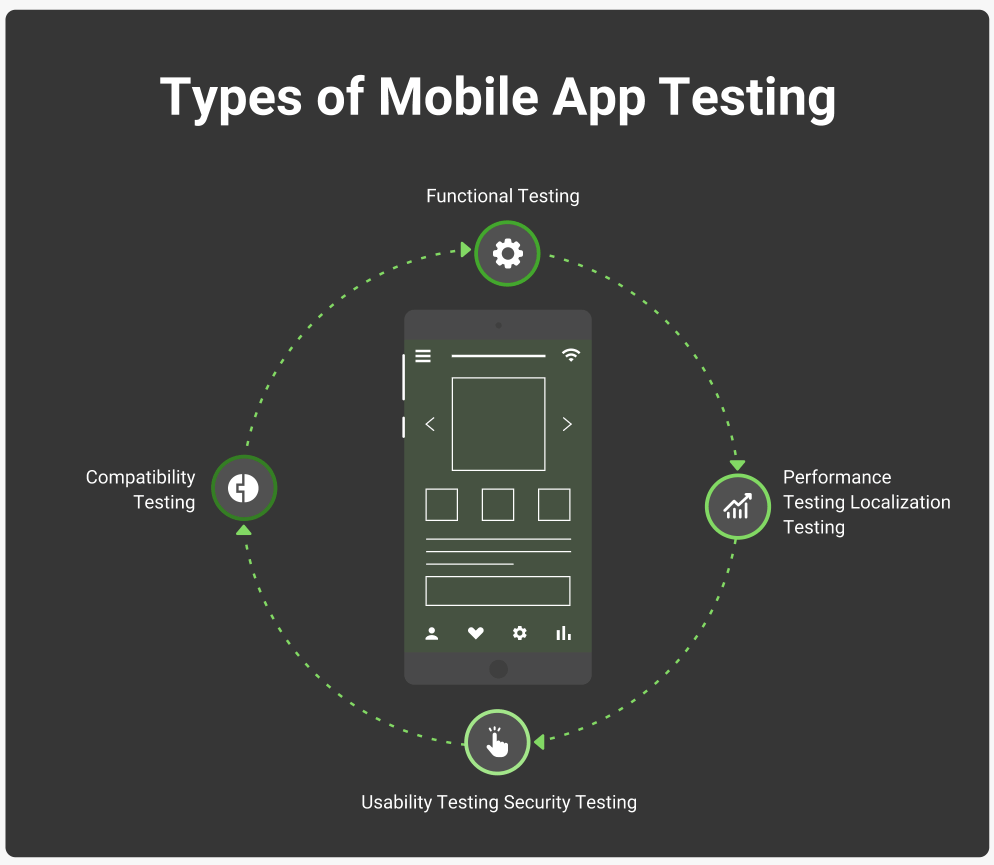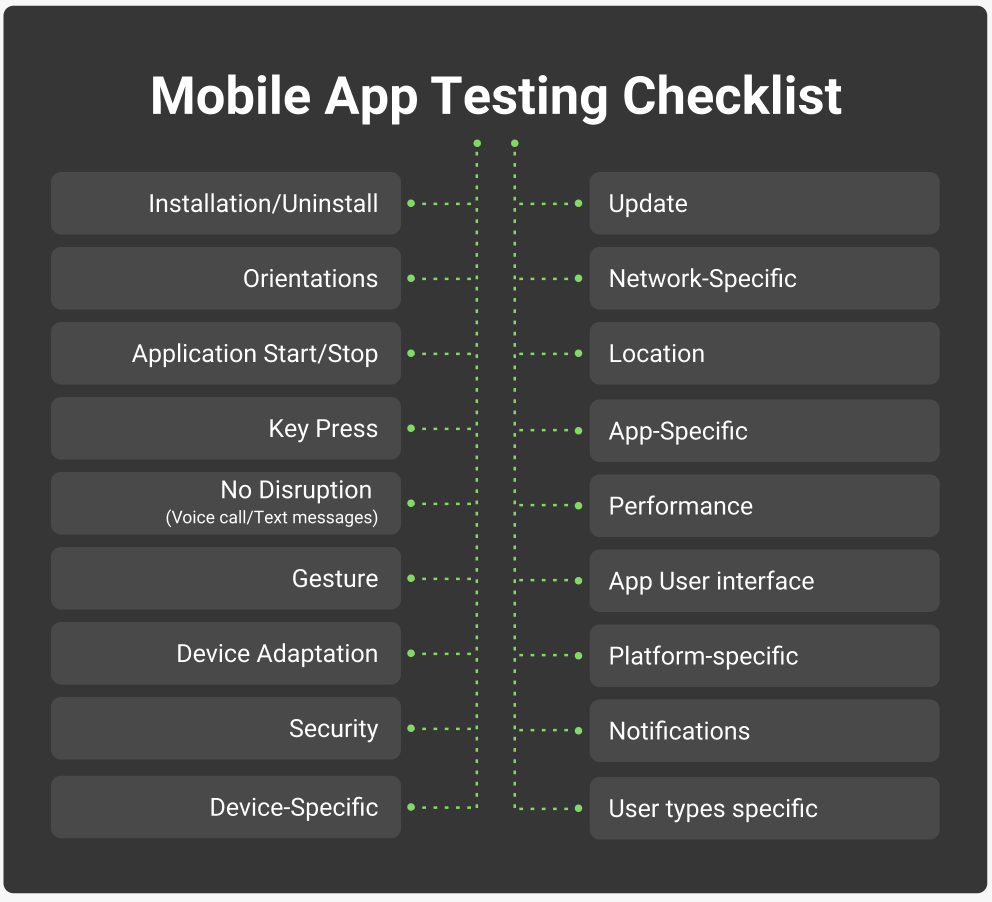We live in a rapidly changing world, and the vast majority of people have access to innovative technologies. With all this, the market of products and services is overcrowded, and new projects are trying to gain a competitive advantage by entering the market faster. But is haste always so important? According to AppSamurai, in 71% of cases, users uninstall the application due to crashes. These stunning statistics show how essential it is to test a mobile application before it hits the market.
What is Mobile App Testing?
Mobile apps testing compares how apps actually perform with the expected result described in the product specification. Testing serves several purposes. First, it is essential to ensure that the application is working correctly, without crashes or unexpected results. Secondly, to understand how user-friendly the product is. At the same time, testing has various subspecies, as well as the use of several devices.
Before a product hits the market, it is crucial to understand how it will display and work on various screen extensions, including tablets. Also, an iOS application may function differently than Android apps. As you can imagine, testing a mobile application is a complex process that requires time and special preparation. It is necessary to test any product, regardless of the industry, whether it is a business process management application or a game.
4 Reasons Why You Need to do Mobile App Testing

A frivolous company that rejects testing is unlikely to be successful in the marketplace. Most negative reviews in the AppStore or Google Play Market are about errors and failures in the application, which could have been avoided if the company had performed testing in a timely manner. We have prepared a list of the main benefits and reasons you do in-depth testing of your application.
#1 Proper Functioning
Certain professionals, called Quality Assurance engineers, carry out custom app development testing. Their main task is to make sure that the application works correctly. At the same time, they also conduct installation testing to understand the user experience before the application is launched. In general, QAs cover the entire set of software functions, including its appearance and display of elements on the screen. They give a complete picture of how the product works, which means they can find any errors and issues before the application is made available to download in the market.
#2 Attractive UI/UX
Through testing, quality assurance engineers can put themselves in the user's shoes and evaluate product designs. They give an overall impression of performance by checking how convenient and intuitive an app is. In turn, this will allow making the appropriate changes at the development stage, reducing potential user discontent in the future.
#3 Increase Loyalty
When you test your app, you will naturally find issues before the application is launched. Unfortunately, it is impossible to get rid of all bugs during the development process. Even if you hire professional developers who write clean code, you will still have some application issues. Of course, when cooperating with an experienced team, problems can be reduced to small flaws that can be easily and quickly corrected. But you need to understand that if we are talking about developing a scalable product with extended functionality, then this is a complex system that consists of various components. And these components may not always interact correctly with each other. Thus, by carrying out testing, you get the opportunity to calibrate the software. In turn, this will make it more reliable and increase loyalty among users. Various studies show that users will not make purchases within a mobile application if they have already encountered bugs or crashes in it.
#4 Get More Customers
It may seem that testing has little to do with attracting customers, but according to Google’s Think Insights, 89% of users recommend a brand after a positive mobile app experience. Thus, by improving the user experience through testing, you get more new customers.
Want to test your project but don't know where to start? Hire a first-class quality assurance team from KeyUA to make your product stand out.
Contact UsMobile Testing Types
Various types of testing are designed to cover any significant aspect of the application. The combination of these styles will allow you to test all the functionality of the application qualitatively. So, let's look at what are the primary points of mobile app testing services.

Functional Testing
The main goal of this type of testing is to check the functionality of the application and make sure that it works in accordance with the requirements. In this way, QA checks business logic, installation, and launch of the application, as well as its main functions after the release of the update.
Performance Testing
Mobile app performance testing aims to check an application’s performance, integrity, and stability under varying loads. This is an essential type of software checking if you expect a large flow of users. In this sort of testing, checked components include response time to various requests and operability under high and medium load.
Usability Testing
Mobile app usability testing is used to trace the response of the software to typical user actions. Its purpose is to determine whether the application has an intuitive interface and can provide a positive user experience.
Compatibility Testing
Such checks demonstrate the compatibility of the mobile application with various mobile devices, including tablets. It covers testing the application on various screen sizes, cross-platform testing, configuring networks, databases, and load on operative memory.
Security Testing
Mobile app security testing is designed to identify any vulnerabilities through which data leakage can occur. This covers login and password verification, protection against hacker attacks, application encryption systems, cookies, caching, and all other inner security services.
Localization Testing
This validation category aims to ensure that your application is appropriate for the region where your target audience is located. It is important if you want your product to go to the international market. Thus, the adaptability of the application is checked against the language and culture of potential users.
Manual vs. Automated Mobile App Testing
There are two main approaches to testing applications in the world of quality assurance: manual and automated testing. Manual testing means that a QA engineer checks the functionality as if it were a real user, while automatic testing means to create a program that will test the application. Manual testing is more straightforward and can cover all aspects of the system. At the same time, automation is not a substitute for manual testing, but on the contrary, it is instead an addition to cover the system’s functionality more deeply.
By and large, to qualitatively check how your product works, it is enough to conduct manual testing, having created and documented test scenarios previously. Automated mobile app testing is used in the following cases:
Many manual tests are taking more and more time to complete.
The percentage of missing errors in manual testing increases.
There is a long time interval between the detection of an error and its correction.
It needs to support older versions of the application.
It needs to be sure that the new code doesn't break previous versions.
It is also worth noting that autotests are created by developers as well; this is called unit testing. It lies in the fact that programmers write an app to test their own code. This takes extra time but allows fixing errors before QA engineers start testing the product.
Trust only professionals to check your functionality to balance your budget. At KeyUA, we provide testing services at reasonable prices.
Contact UsKey Factors Influencing Mobile App Testing
When we talk about quality assurance testing, there are several key factors to look out for in this matter.
Choosing a mobile device. As we already know, app design can look different on various devices. So, when checking your software, you should test it, at least on the leading smartphones and tablets that potential customers use. How to understand which ones? You need to draw up a portrait of your target audience with as detailed a profile as possible.
Mobile Simulators. When an application needs to be tested on a wide range of devices, mobile simulators come into play. These are programs that show how the application will be displayed on various screen extensions. They are easy to use and seem to be a cost-effective solution.
Cloud Testing Tools. Quite often, quality assurance engineers combine manual and automated testing. They use different programs to create a specific set of steps, which are performed automatically by a third-party application. As a result, the tester receives a report on the implementation of these steps. If the test covers all the planned actions, then the case is working correctly and does not contain bugs. If the test fails, then there are errors in the application. Automated testing is also useful when an application has already entered the market. When new features are added, and application maintenance takes place, testing needs to occur before launching new functions. These automated testing tools include Browserstack, Pcloudy, Perfecto, the AWS Device Farm, and Selenium.
Network Conditions. Another aspect of testing mobile applications is to check how it works in different conditions of network access.
Test Cycle. It is essential to understand that testing is not a one-off activity. It is a long-term process that has its own stages and final result. First, QA specialists create test cases, combine them into a test plan, and then go through all the steps of those scenarios. If defects are found, they create reports and send them to the developers. After the flaws have been fixed, testers go through test scripts again to ensure that the bugs are fixed.
Selection of the type of testing. You have to decide whether it makes sense to automate scripts or if manual testing is enough.
Certain Challenges In Mobile App Testing
Whether you are developing a hybrid, native, or progressive mobile app, you may face some difficulties. Testing your code can be tricky if you're targeting a wide range of devices, and even cloud tools and automation solutions can't always solve this problem. When such cases occur, QA engineers tend to focus on validating the application on the most common devices.
In addition to mobile app speed testing its functionality and security, it is also essential to check how convenient it will be for users to interact with software. This is easy to achieve due to various third-analytics services.
Testing is the Key to Your Success
Any business needs to determine that an application is working correctly before it is released to the market. Preparation for testing should occur at the development stage and include creating test scenarios and test cases based on the project specification. As you already know, various areas need to be tested based on roles within the team. See the app testing checklist to make your checks more effective.

Application testing is a complex process that must be performed by both quality assurance engineers and programmers to test their own code. This is time-consuming, and many startups prefer to skip this step, reducing the development cost. But this is a big mistake. In any case, it is better not to launch the product with errors. Otherwise, users will refuse to use your software, and the release will fail.
Conclusion
As per Catchpoint, 65% of customers say a bad user experience negatively impacts their opinion of the brand. This once again underlines why mobile app testing is crucial before launching a product.
At KeyUA, we have significant experience not only in developing custom software but also in checking products of any complexity. Since 2008, we have been providing both manual and automation testing services for businesses of all sizes. If you want your product to be among the highest quality options, count on us to always take care of in-depth and effective testing.
Benefit your business by partnering with KeyUA and ensure that your project is of the highest quality.
Contact Us







 Unit 1505 124 City Road, London, United Kingdom, EC1V 2NX
Unit 1505 124 City Road, London, United Kingdom, EC1V 2NX

Comments
Leave a comment